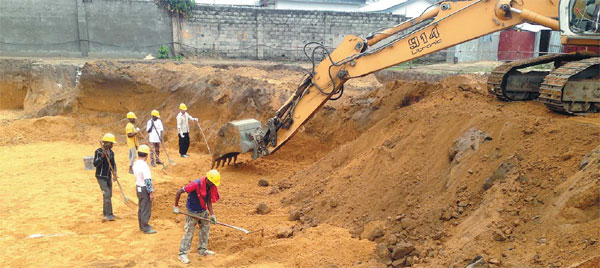A showcase of overseas expansion
|
Employees of Beijing Uni-Construction Group Co Ltd (Congo) at a construction site in the Republic of Congo. Photo by Zhang Wei / China Daily |
Competition is building as more chinese firms realize the potential in the republic of Congo
Nestled off a bustling street at the center of Brazzaville, the compound of Beijing Uni-Construction Group Co Ltd (Congo) is quiet this hot morning.
Lines of trucks and piles of construction materials sit idle.
"It is the Dragon Boat Festival, so all the workers are on holiday," Zhang Linghu, the general manger says.
As one of the first Chinese companies to set foot in the Republic of Congo, Beijing Uni-Construction has always striven to become a member of the local community.
"We give days off to our workers during important festivals, whether they are Chinese or Congolese," Zhang says.
"We respect our local employees' customs."
The company first came to the continent to complete a charity project in the 1980s to build a stadium in the Democratic Republic of Congo.
The giant arena, which can hold 80,000 people, was the biggest at that time in Africa, Zhang says.
"Back then, there was not even stadium that size in China, I think."
However, the company had to relocate to the Republic of Congo in the 1990s after war broke out between the two, and it moved across Congo River to Brazzaville, where it has stayed ever since, and expanded.
Starting from small projects, the company has gradually built its reputation and now boasts many landmark buildings in Congo, such as that of the National Petroleum Company of the Congo, and the country's ministries of foreign affairs and justice.
Most of the contracts are for the government, he says, such as a hospital, a major government building, a conference center in Brazzaville, and in Pointe Noire, the country's second-largest city.
"We are very proud to be part of the effort to change how the country looks and to boost its local economy and its workforce," he says.
The company has 400 Chinese and more than 1,000 local workers.
"Congolese workers often join us with no experience or working skills, so we have to invest a lot of time and effort training them," he says.
At one of its typical construction sites, a Chinese worker usually has to teach more than two dozen local workers, he says.
In three to five years of work, an unskilled Congolese worker can become an efficient mechanic, but some often quit to set up their own businesses.
"It is a loss for us, but we are glad to see them building a better life with the skills they learned here," Zhang says
Zhang says competition is becoming increasingly fierce in Congo, especially with the influx of an estimated 20 more Chinese companies, which now dominate the country's construction sector.
"The scale of the market is not unlimited, so each company can only take a slice," he says.
There used to be no bidding process, but as more firms position themselves in the market, the government has started competitive bidding on all its contracts.
"Most of the time, it is Chinese companies competing with each other, and bidding has certainly brought prices down," he says, and the biggest beneficiary is clearly government coffers.
The Congo operation is now Beijing Uni-Construction's largest overseas.
"We came here early, and it is very much the shop-window now for our international operations," Zhang says.
The country's relatively peaceful and safe business environment is an important factor for it staying so long.
"Without peace and stability, people would lose everything."
With Congo as its base, the company continues to seek opportunities in surrounding regions.
"If we want long-term development, we need to find new growth points," Zhang says.
Liu Wei, the company's chief economist, says that it also plans to grow its business portfolio in Africa.
"We are looking at areas such as food processing, which we think will benefit communities tremendously."
Contact the writers through [email protected]
Zhang Yuwei contributed to this story.

























